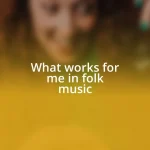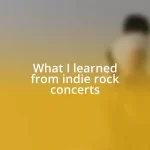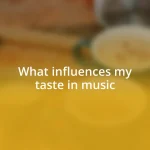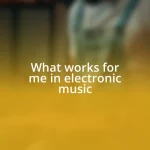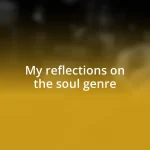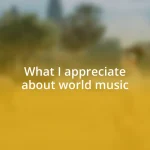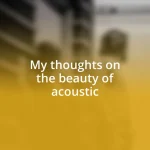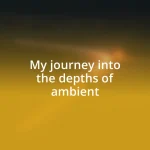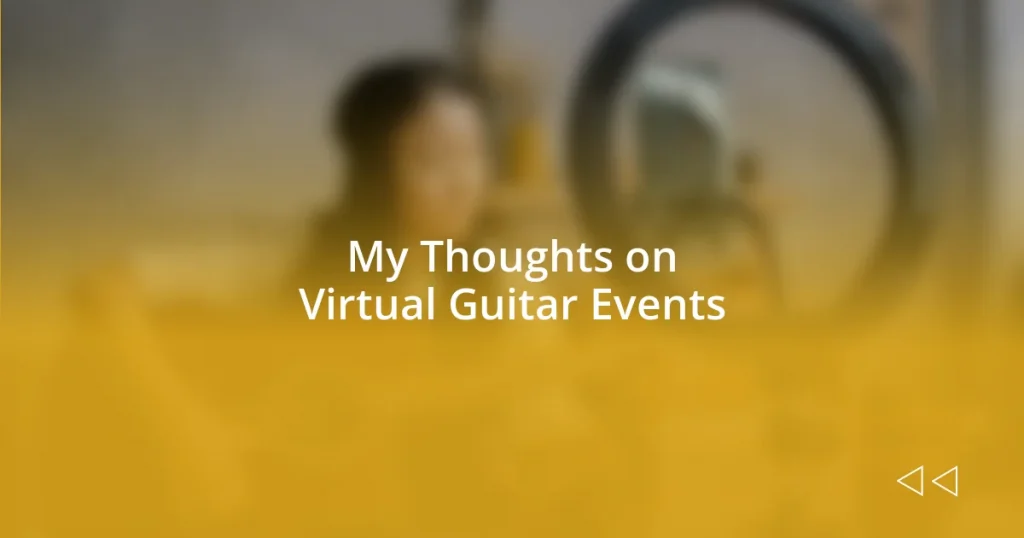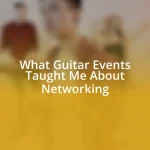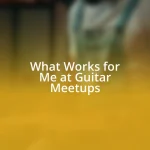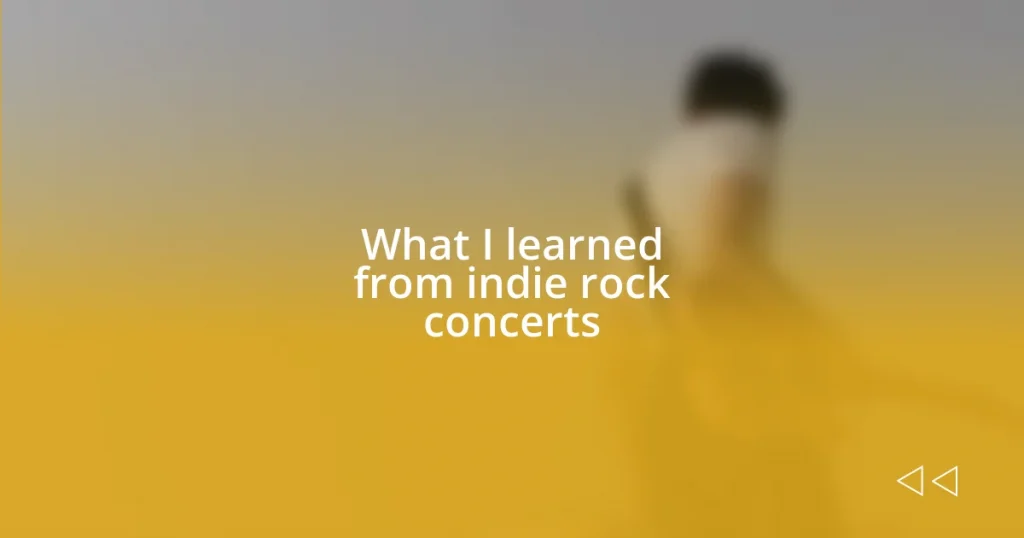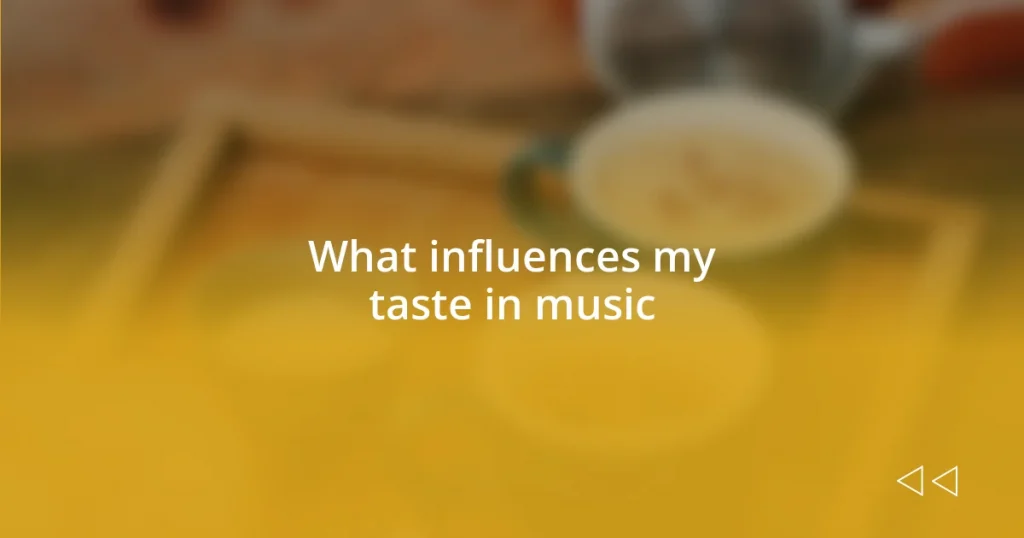Key takeaways:
- Virtual guitar events enhance accessibility, allowing musicians from around the world to connect and learn without geographical limitations.
- Participants can maximize their experience by preparing equipment, engaging with others, and actively asking questions during sessions.
- Future trends suggest a shift towards hybrid and personalized experiences in virtual guitar events, with the potential integration of immersive technologies like virtual reality.

Benefits of Virtual Guitar Events
One of the standout benefits of virtual guitar events is the accessibility they offer. I remember attending a live-streamed masterclass with a renowned guitarist who I never thought I’d have a chance to learn from in person. It was a game-changer for me—suddenly, geographical barriers melted away, and I could connect with players from all over the world. Doesn’t that make you feel like the music community is truly universal?
Another advantage is the variety of content available in these events. You can find everything from workshops to jam sessions, catering to different skill levels and interests. When I joined a virtual jam night, I was surprised by how many styles were represented. Playing alongside jazz, rock, and blues guitarists online opened my ears to new sounds and techniques, and it felt like a mini guitar festival right from my living room!
Finally, virtual guitar events often have a lower cost compared to in-person gatherings. I’ve been able to participate in high-quality sessions that were either free or significantly cheaper than traveling to a convention. Think about it—who wouldn’t want to save money while still enhancing their skills and networking with fellow musicians? It’s a win-win situation that just makes sense!

Popular Virtual Guitar Platforms
When diving into the world of virtual guitar events, several platforms really stand out for their unique features and offerings. For me, attending a workshop on JamKazam was a transformative experience. The way it allows musicians to play together in real-time, despite physical distance, brings a rush of excitement. I felt like I was right there in the same room with my fellow players, sharing spontaneous riffs and learning from each other.
Here are some popular virtual guitar platforms to consider:
- JamKazam: Great for real-time jam sessions with musicians worldwide.
- MasterClass: Offers high-quality video lessons from renowned guitarists.
- YouTube Live: Perfect for watching live performances and tutorials.
- Discord: A community-centric platform for informal jams and discussions.
- Guitar Pro: A tool for learning through shared tabs and exercises, with built-in networking features.
Each of these platforms has its own charm and can cater to various preferences, making it easier than ever to engage with the guitar community online.

Tips for Participating Effectively
When engaging in virtual guitar events, preparation is key. I always make sure my equipment is set up and tested beforehand. Trust me—there’s nothing quite as frustrating as joining a session only to discover that your microphone isn’t working. A little prep can ensure you focus on what truly matters: the music and the connections you’re making.
Interacting with fellow participants can really elevate your experience. I remember a time when I decided to share a quick solo during an online jam. The positive feedback from other musicians not only boosted my confidence but also sparked some meaningful conversations after the session. Engaging with others enhances not just your playing but also helps forge friendships that can last beyond the event.
Lastly, don’t hesitate to ask questions during workshops or masterclasses. I once attended a Q&A session after a lesson, and the insights the instructor shared were invaluable. It felt good to dive deeper into techniques that resonated with me, creating a sense of community and shared learning. Engaging actively in this way truly transforms your experience from passive watching to participating fully.
| Tip | Details |
|---|---|
| Prepare Your Equipment | Test your microphone and camera before joining an event to avoid technical issues. |
| Engage with Others | Share your playing and chat with participants to build connections and friendships. |
| Ask Questions | Inquire during Q&A sessions to enhance your understanding and learning experience. |

Engaging with Guitar Communities Online
Engaging with guitar communities online has led me to discover friendships that transcend traditional boundaries. The first time I logged into a Discord server dedicated to guitarists, I felt a bit nervous. What if no one wanted to talk to me? But as I shared my latest cover, I was amazed by the supportive comments and constructive critique I received. It reminded me that musicians share a common bond that goes beyond skill level; it’s about passion and the joy of creating music together.
One experience that stood out was participating in a virtual open mic night. I was initially hesitant to share my song, worried about how others might perceive it. But the moment I hit “play,” I was overwhelmed by the encouragement from my peers. It’s incredible how a simple platform can create a space where vulnerability is celebrated and creativity is nurtured. Have you ever felt that rush of support from fellow musicians? It’s a feeling I cherish, knowing I’m part of a community that lifts each other up.
When I think about the discussions that unfold during these online events, it strikes me how they can sometimes lead to deeper insights about our craft. I joined a workshop on fingerstyle guitar playing, and the insights shared by participants during breakout sessions enriched my understanding immensely. Each person brought their unique perspective, turning a simple lesson into a rich tapestry of ideas. It’s moments like these that remind me why I love being part of guitar communities—there’s always something new to learn, and every interaction feels meaningful.

Maximizing Learning from Virtual Events
Maximizing learning during virtual events often hinges on how actively we engage with the content and community. I once attended a series of online workshops where I made it a point to take detailed notes. Later, I realized that reviewing those notes helped me synthesize what I had learned, allowing me to put new techniques directly into practice. Isn’t it rewarding when a session you attended has immediate application in your playing?
I also discovered the power of sharing my own insights during discussions. In one particular session, I casually offered my perspective on a complex chord progression that stumped many. The positive reactions not only reinforced my understanding but invited others to share their interpretations, turning a solo learning experience into a collaborative learning adventure. Have you ever found that sharing your thoughts leads to unexpected revelations? It truly is a catalyst for deep learning.
Finally, setting personal goals before attending an event can sharpen your focus. I recall deciding to master a specific technique I’d seen featured in a workshop. Each session became a stepping stone toward that goal, and having that clear target enhanced my motivation and engagement throughout the event. Don’t you think having a purpose transforms your learning experience into something more fulfilling?
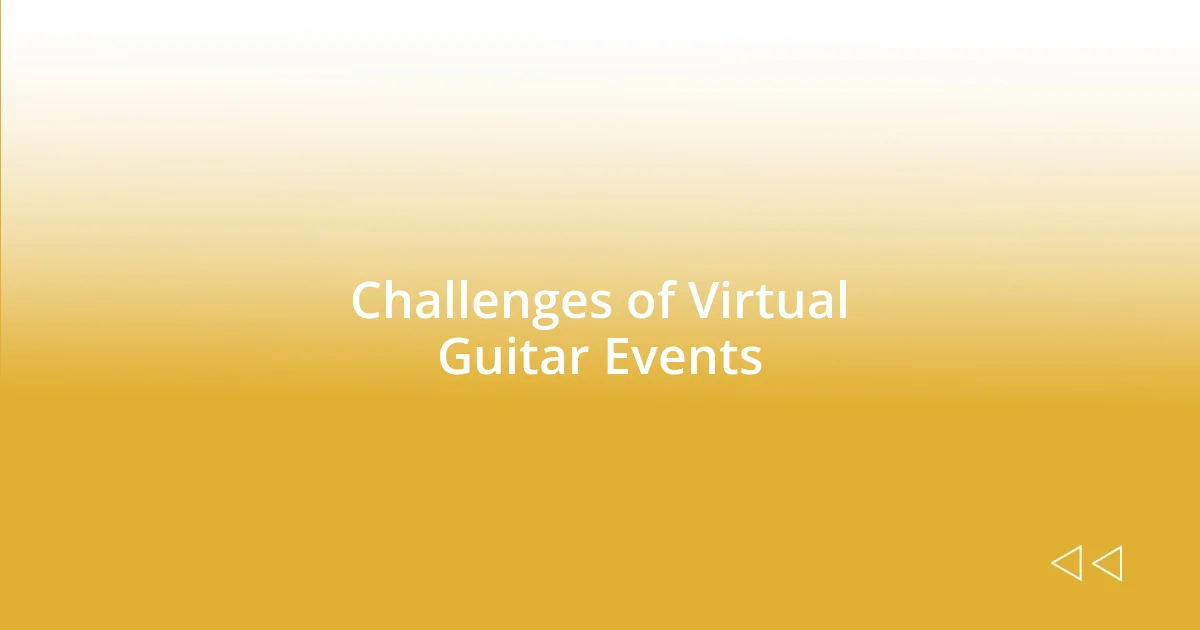
Challenges of Virtual Guitar Events
One of the most significant challenges I’ve faced with virtual guitar events is the lack of personal connection. While I appreciate the convenience of hopping online, I often miss the palpable energy found in a live setting. Remember that awkward pause when a performer finishes their piece, and only silence fills the virtual space? It can feel isolating. Have you ever wished for the applause or even just a couple of nods from your audience? That physical feedback can be incredibly motivating and is often lost in the digital realm.
Then there’s the issue of technology. I once joined an online guitar workshop, eager to absorb fresh tips. Unfortunately, technical difficulties plagued the session. From freezing screens to audio glitches, it became frustrating to engage fully. It made me wonder: how can we ensure that tech enhances our experience rather than detracts from it? I often find myself anxious about whether I’ll be able to connect smoothly, which can overshadow my enthusiasm for the actual content.
Lastly, it’s challenging to maintain the same level of attention in a virtual setting. I remember logging into a streaming concert, initially thrilled, only to find my mind drifting to my phone or the snacks in my kitchen. Have you ever caught yourself multitasking during an online event? That distracted engagement can lead to missed insights and diminish the overall experience. It’s a constant battle to stay present when the comforts of home lure you in.

Future of Virtual Guitar Events
Looking ahead, I genuinely believe that virtual guitar events will evolve into hybrid formats, blending the best of both worlds. Just last month, I participated in a local jam session that had both in-person and online attendees. It was fascinating to see how the virtual participants interacted with those in the room, sharing tips and riffs seamlessly. Isn’t it exciting to think about how technology can bridge distances, allowing musicians from different corners of the world to collaborate?
Moreover, I feel there’s immense potential for personalized experiences in these virtual settings. Imagine an event where you could choose your own workshops based on your interests, or even have one-on-one sessions with your favorite guitarists. I remember a masterclass I attended where the instructor took time to address everyone’s unique challenges. That level of personal attention made me feel special, and I think future events could build on that idea to create even more impactful learning experiences. What if each participant could walk away not just with skills, but with a tailored plan to enhance their playing?
As the technology behind these events matures, I envision a future where virtual reality becomes a staple in guitar events. I can just picture myself putting on a headset and finding myself in a virtual concert, feeling like I’m right there among the audience. During a recent online concert, a fellow guitarist suggested that VR could create that missing energy we’re all searching for. Have you ever thought about how immersive experiences could revolutionize the way we connect with music? I truly feel that this is not just a possibility but an exciting path we’re heading toward.
